Sponsored by Garmin
Here is a top-10 list that is sure to get people searching into a future fishing trip.
It was not that long ago that “Trout” were deemed as Canada’s most popular gamefish. But if you really dig into it, the word Trout on its own is quite generic. Had that category been a specific strain like Lake Trout or Rainbow Trout etc., things might have been different.
If you are to fast track to present day in this great fishing country, then currently the Walleye would have to be entered into the ring of this ongoing popularity contest. They are in BC, the Yukon, Nunavut, and NWT, throughout the prairie provinces, Manitoba, Ontario and Quebec.
The Walleye is one of those fish species that not too much negative can be thrown at. Yes, they have been known to give up on a boat side fight much sooner than was expected, but many other times, they have also been known to stalk and smash a crankbait 5 feet from a boat in heart-pounding fashion.
Of course, the highest of marks that a Walleye obtains is because of that flaky, white meat that we have all learned to love.
Looking for a great Walleye Hotspot? Then here are 10 (out of many we might add, for future articles of course) Hotspot picks.
LAST MOUNTAIN LAKE, SASKATCHEWAN
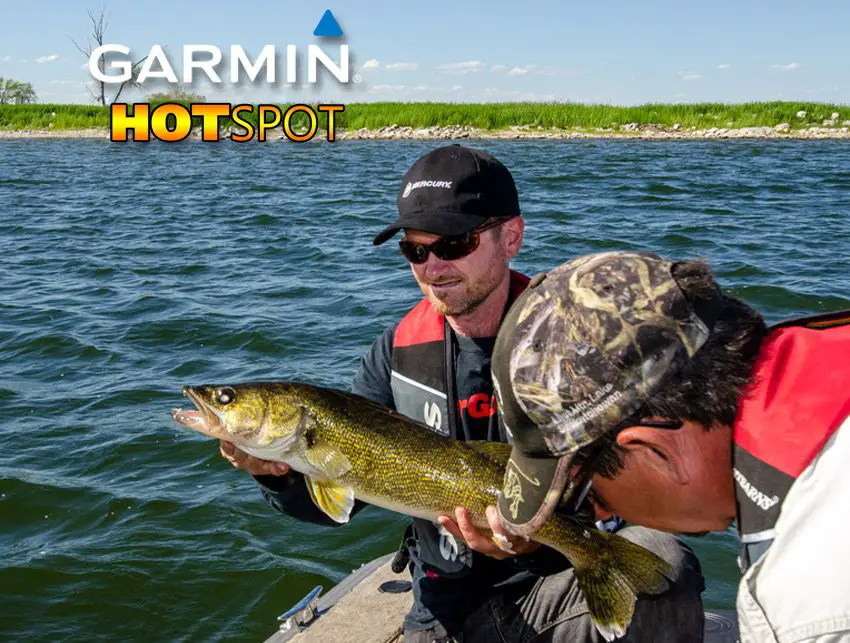
| Location: | Last Mountain Lake, Saskatchewan |
| GPS: | N51º 10.120′ W105º 19.078′ |
| Species: | Northern Pike, Walleye |
This Hotspot is a vast shallow spawning bay on Last Mountain Lake in the province of Saskatchewan. Big Northerns—as well as some gorgeous Walleye—move into this bay early in the year to spawn and feed.
Try casting four to five-inch swimbaits; they are very effective in this area. Start with a steady medium-speed retrieve and then vary if necessary.
Baits: Big Hammer and Yamamoto Swimbaits
Presentation: Cast and Reel
Water depth: 4-6 feet
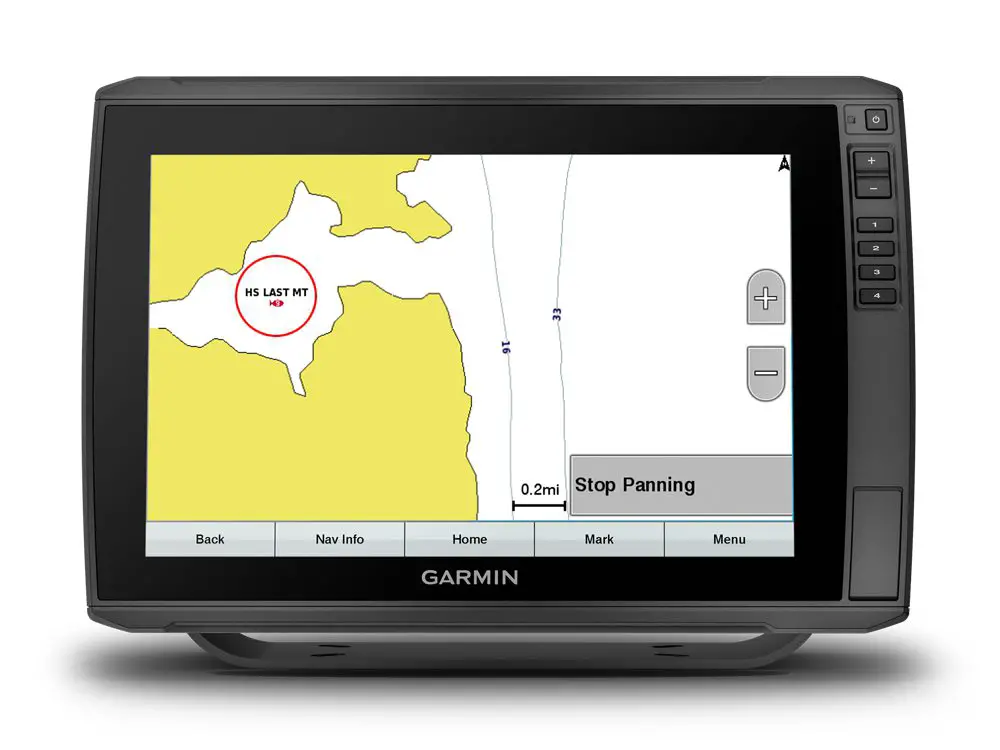
MUSKOKA LAKE, ONTARIO
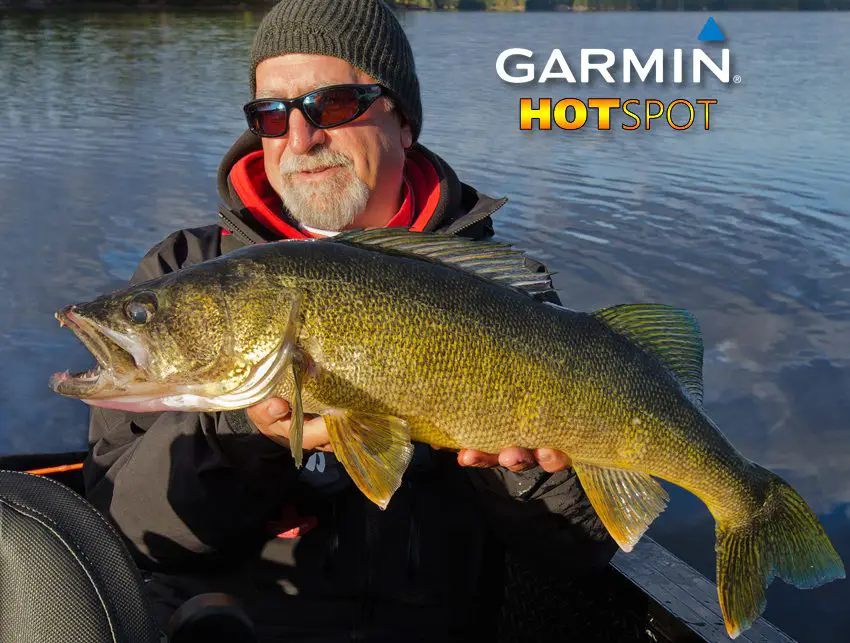
| Location: | Muskoka Lake, Ontario |
| GPS: | N44º 57.500′ W079º 23.609′ |
| Species: | Walleye, Northern Pike, Smallmouth Bass |
This Hotspot is a point for Walleye, Pike, and Smallmouth Bass.
If the fish are cranked up, then throwing 3-5″ plastics are your best bet. If the fish are slow and lethargic, then you may have to switch to live bait.
When using the Traditional, Down Vu, and Side Vu screens on our Garmins, fishing spots like this one are fun to dissect because of the strong signal sent back from the solid rock bottom. Due to the absence of weeds, fish are easy to see as well.
Work this entire Hotspot area from shoreline to deep; the fish could be anywhere on it.
Baits: Swimbaits, Grubs, Live Bait
Presentation: Drifting, Trolling, Casting
Water depth: 2-20+ feet
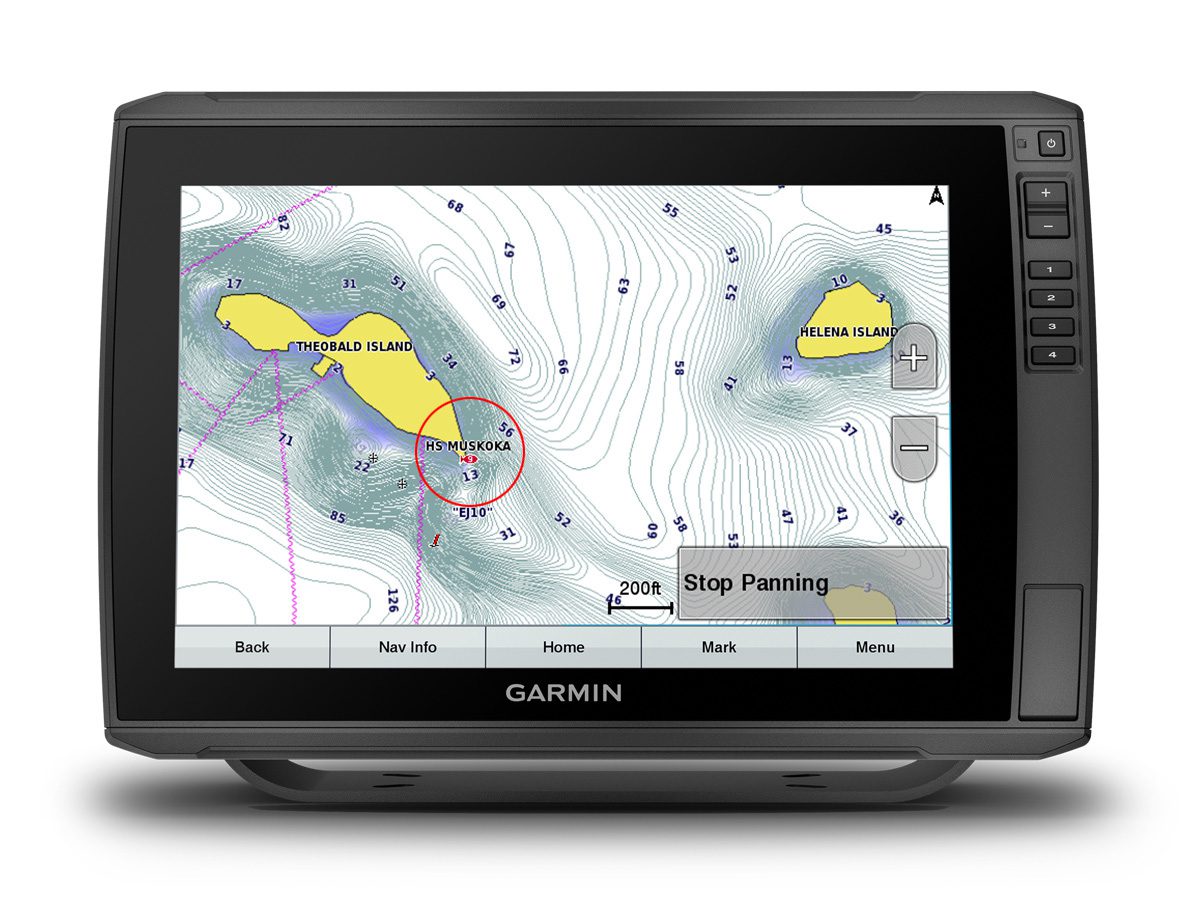
Lac La Biche, Alberta
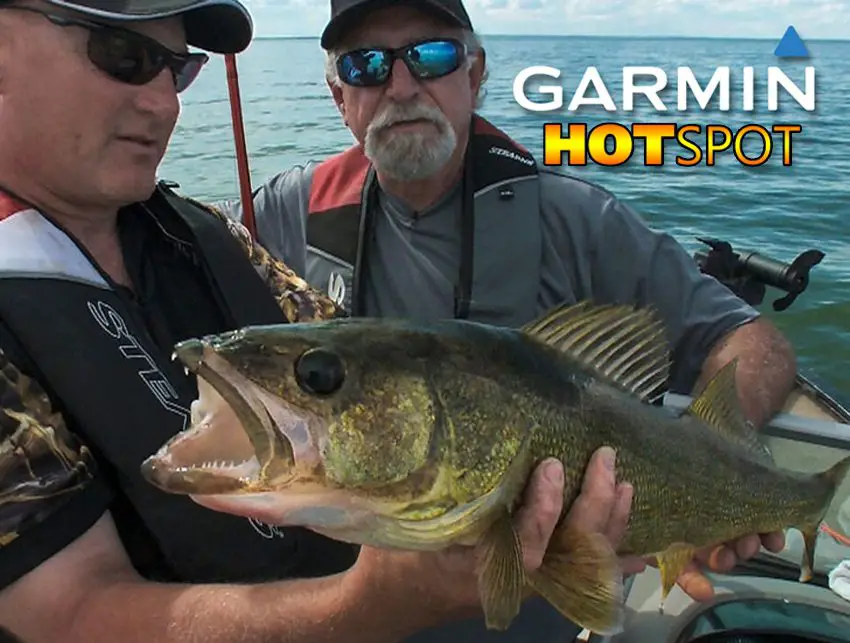
| Location: | Lac La Biche, Alberta |
| GPS: | N54º 50.524′ W112º 07.036′ |
| Species: | Walleye, Northern Pike |
This Hotspot is a series of humps in Lac La Biche in Alberta.
Angelo and Ray Kholrus found this spot with hopes of catching giant Pike but were ultimately surprised—in a good way that is—by the fantastic Walleye fishery La Biche has to offer.
The Walleye on this Hotspot proved once again that it pays big dividends to experiment and think outside of the box!
Baits: Big Swimbaits, Big Grubs.
Presentation: Work on Bottom.
Water depth: 7-30 feet
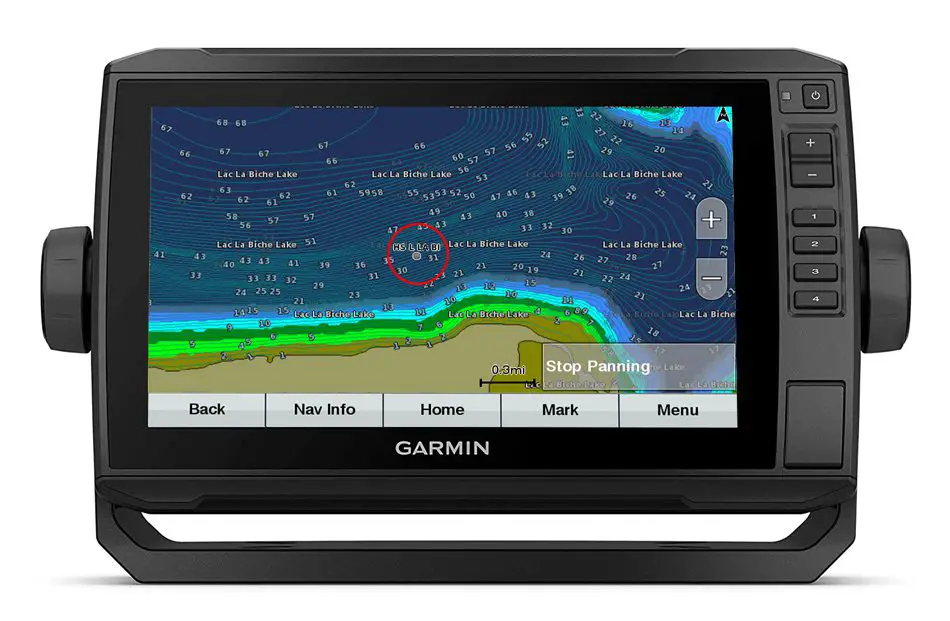
NAGAGAMI LAKE, ONTARIO
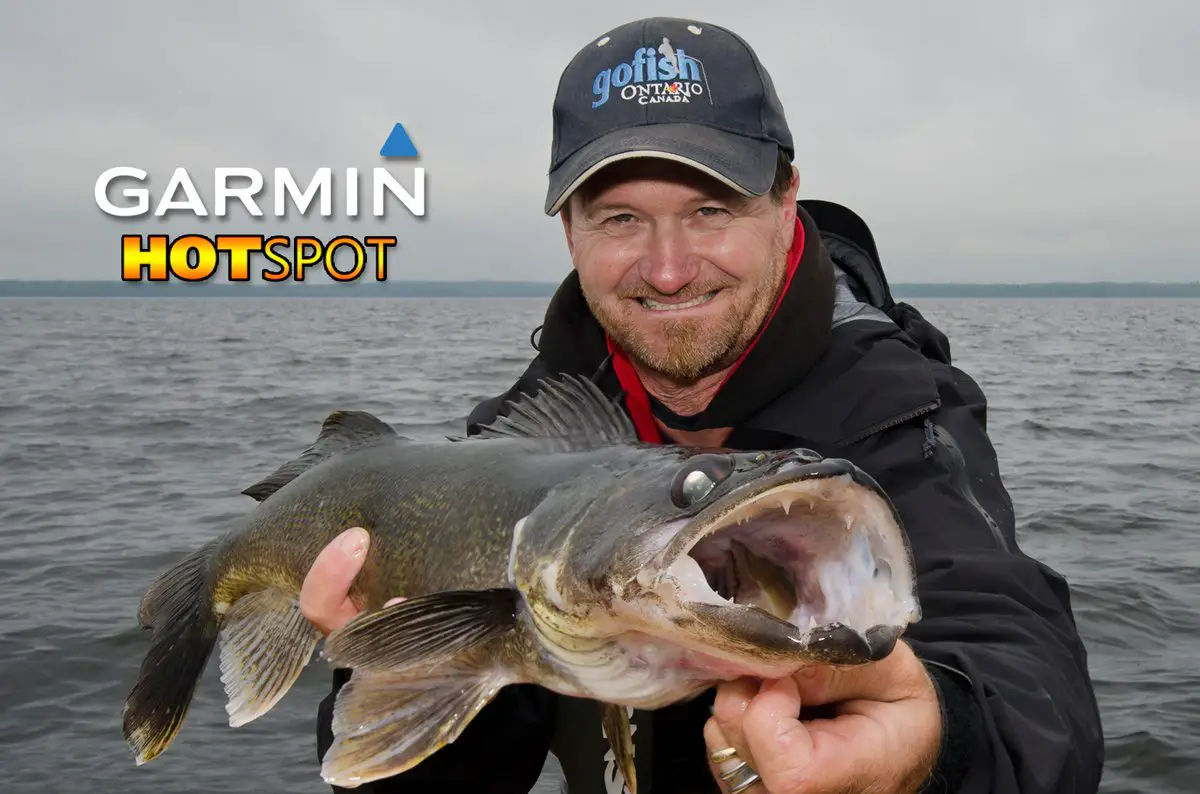
This Hotspot is a medium-sized hump rising from the depths of Nagagami Lake in Northern Ontario. It’s a classic structure that will get even better as the season progresses. To see how Fish’n Canada host Pete Bowman fared on this spot, check out the episode, “Dual Frequency Nagagami Walleye.”
With water in the 50- to 60-degree area, you can try soft plastics on your jig but always have a bucket of minnows on hand just in case.
This structure tops out at around eight to ten feet, then drops off gradually to over 20, and finally plummets to 50 feet. Make sure you check all depths with your Garmin.
Baits: Jig and Plastic. Jig and Minnow.
Presentation: Short casts, slow retrieve, vertical jigging.
Water depth: 8-20 feet.
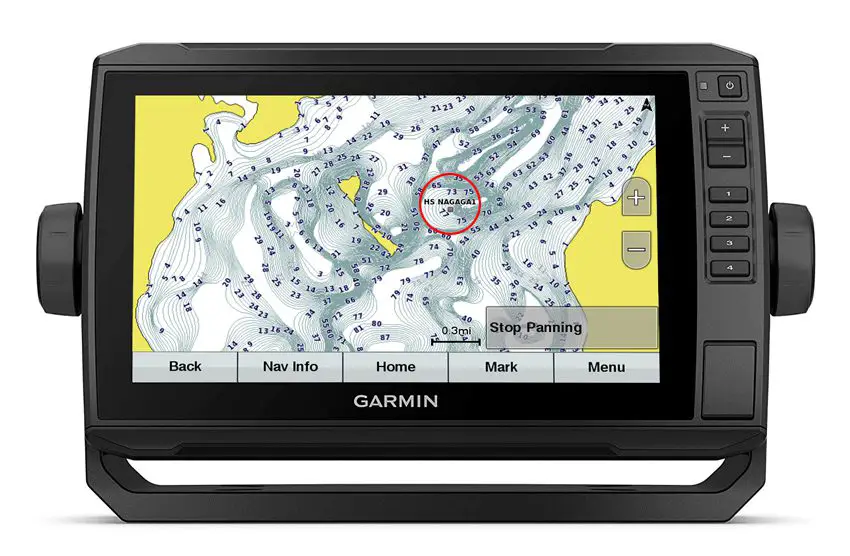
LAC COUGHLIN, QUEBEC
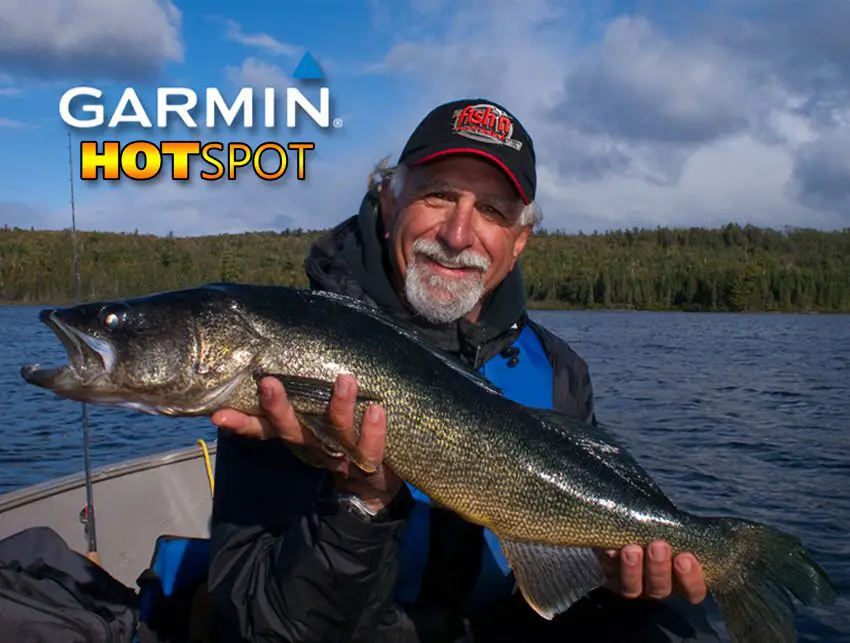
| Location: | Lac Coughlin, Quebec |
| GPS: | N46º 50.791′ W77º 39.342′ |
| Species: | Walleye |
This Hotspot is a break close to an island on one of Moose Territories Lodge’s many Walleye lakes. The waypoint on the screen will get you there. Work the entire area from shallow to 20+ feet. Start with some form of live bait and, if the fishing is crazy, then change to artificials.
Trolling, jigging, or simply dragging live bait are all great options.
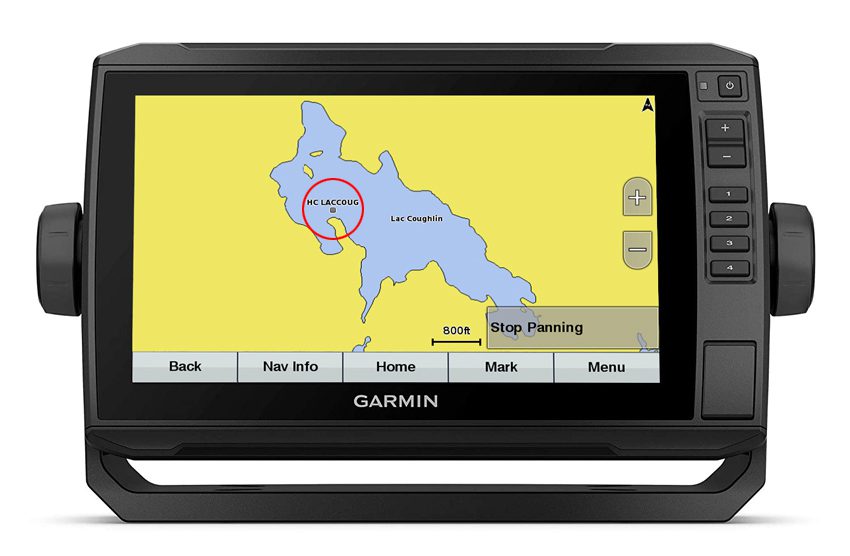
HAWK LAKE, ONTARIO
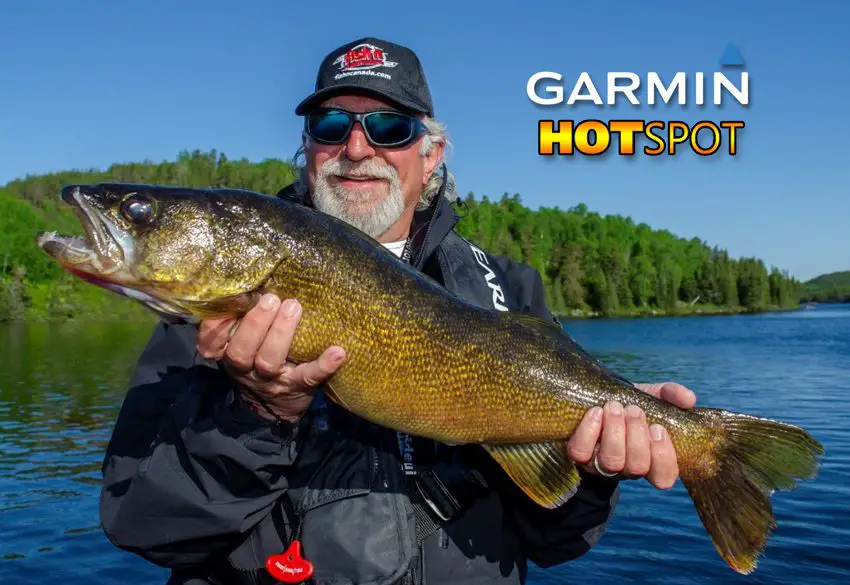
| Location: | Hawk Lake, Ontario |
| GPS: | N49º 45.384′ W094º 02.631′ |
| Species: | Walleye |
This Fish’n Canada Hotspot is on the main-lake side of a point leading into a shallow boulder bay on Hawk Lake in Northern Ontario.
With the bottom here being so flat, look for fish on your sonar. By using a combination screen of Traditional, Clear Vu, and Side Vu, you should be able to pinpoint and cast to individual fish with remarkable accuracy.
Learning to use your electronics and then studying the variety of screens they offer can really increase your odds of producing fish. If it works for us, it will work for you!
Baits: Jig and Leech
Presentation: Cast or drop to individual fish
Water depth: 18-25 feet
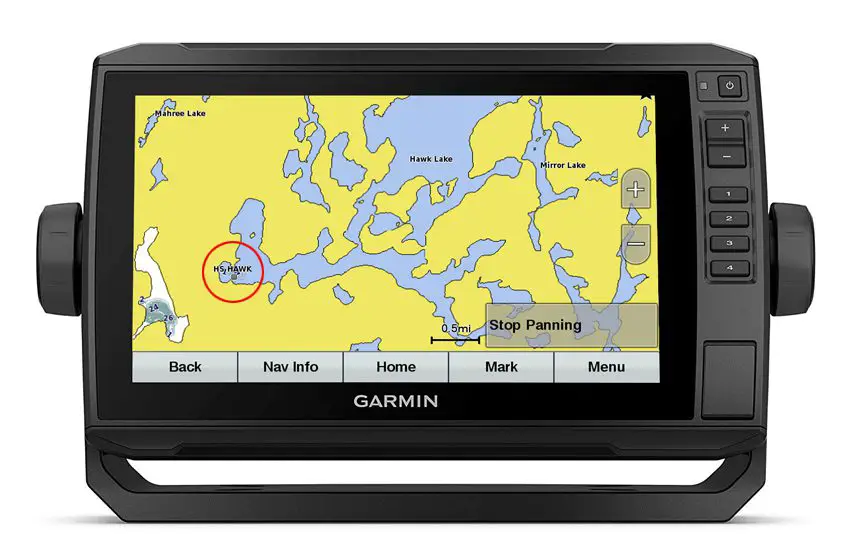
LESSER SLAVE LAKE, ALBERTA
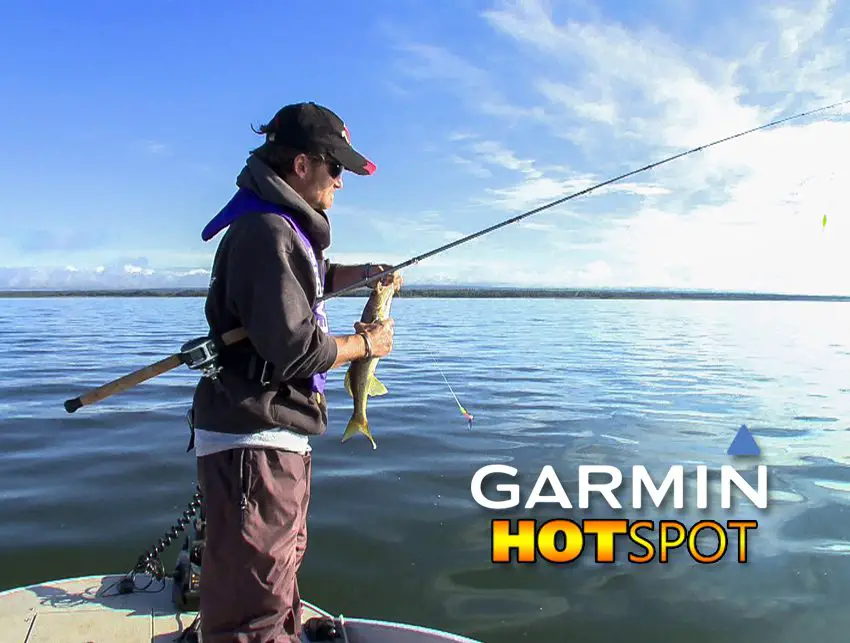
This Alberta Hotspot is a flat near the narrows that separate the two large sections of Lesser Slave Lake. This is an area that needs lots of searching since the fish will not sit in one specific spot for very long. Typical of a flat, this area has groups of Walleye moving in and out at different times.
Try trolling spinners tipped with worms, Walleye-style crankbaits, or dragging a jig and drop shot combo. Vary your speeds.
Depth: 12 – 25 feet.
Rig: Bottom Bouncers; Jigs Drop Shots with Live Bait; Walleye-style Crankbaits.
Technique: Drift Using Wind; Slow Troll with Electric Motor; Troll with Kicker.
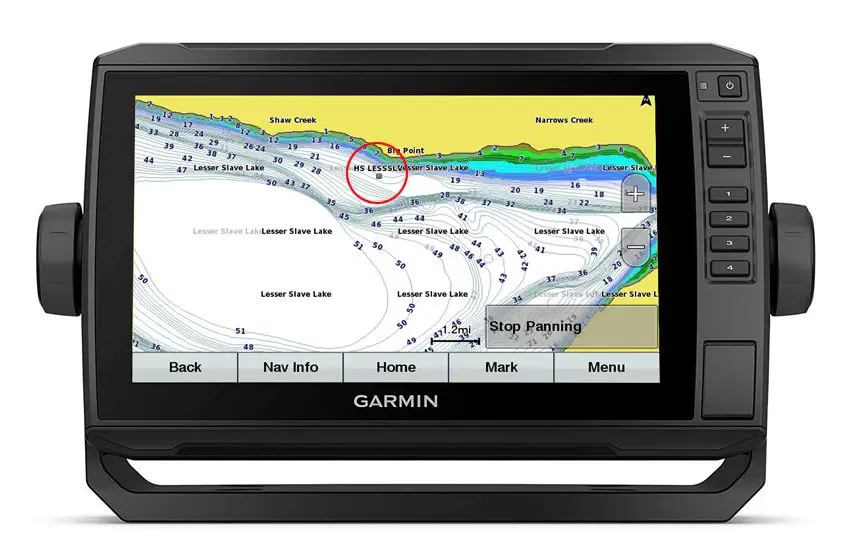
ESNAGI LAKE, ONTARIO
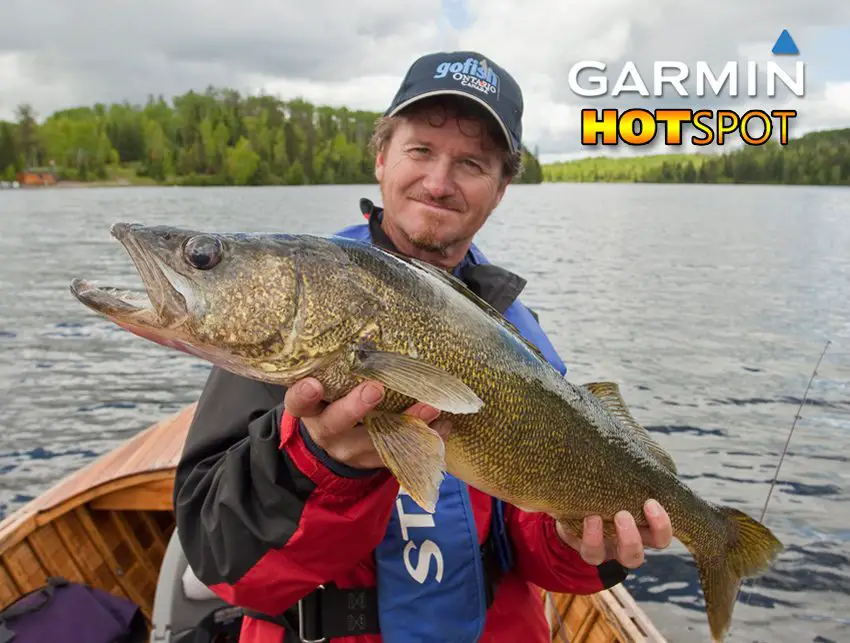
| Location: | Esnagi Lake, Ontario |
| GPS: | N48º 30.269′ W084º 29.538′ |
| Species: | Walleye |
This Hotspot is a great one for big Walleye and it’s close to the world-class Lodge 88. Troll or drift parallel to the bank in around seven to fourteen feet of water with a worm harness, a leech on a drop shot or live bait rig, or even a crankbait.
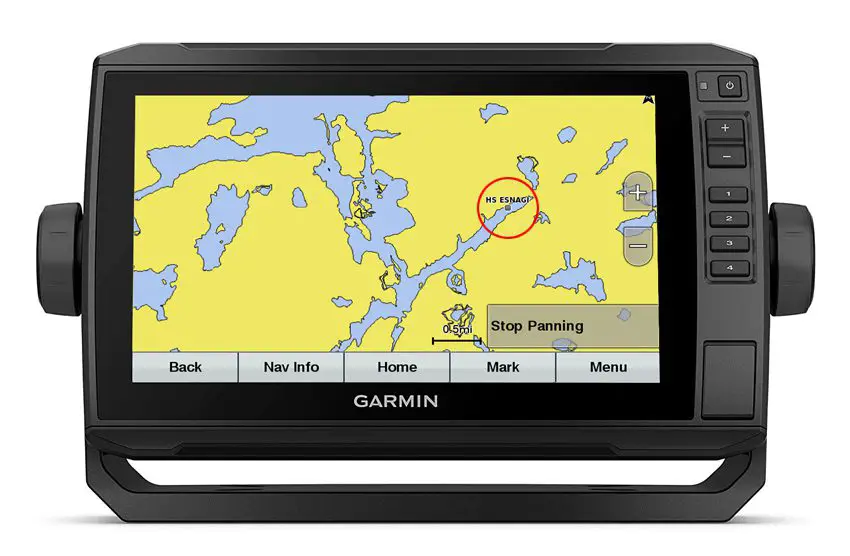
CALLING LAKE, ALBERTA
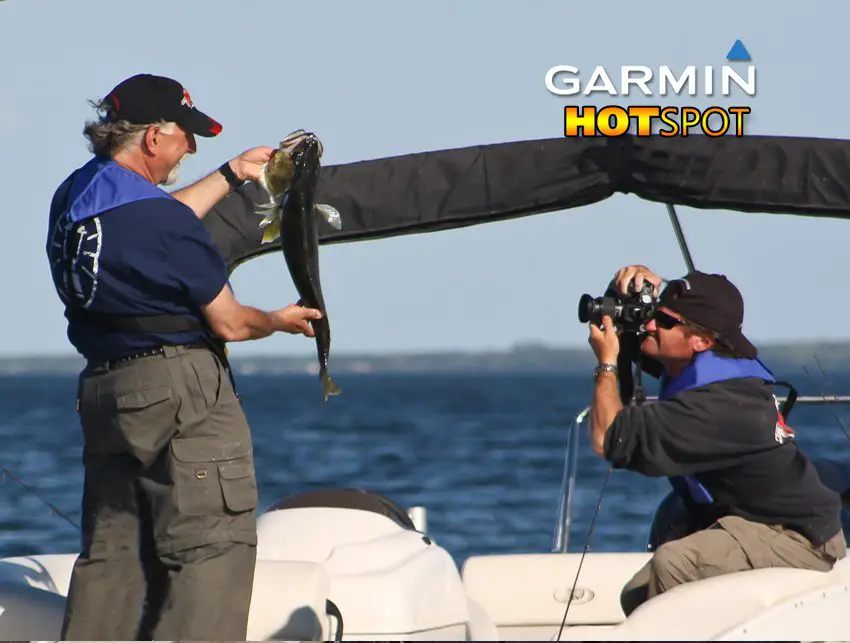
| Location: | Calling Lake, Alberta |
| GPS: | N 55° 13.443, W 113° 21.974 |
| Species: | Walleye |
This Hotspot is a fast-breaking drop off of what’s referred to as Volkswagen Point on Calling Lake in Alberta. The waypoint will put you right on it!
It’s easy to recognize because there’s literally an old broken down Volkswagen on the shore almost directly opposite the waypoint. When we were there we used jigs and dead minnows—remember, live minnows aren’t allowed here—and caught an incredible amount of quality Walleye. As a matter of fact, we believe it’s the most double-headers we’ve ever caught on one spot!
For info on fishing Calling Lake, contact Ray at Reel Angling Adventures.
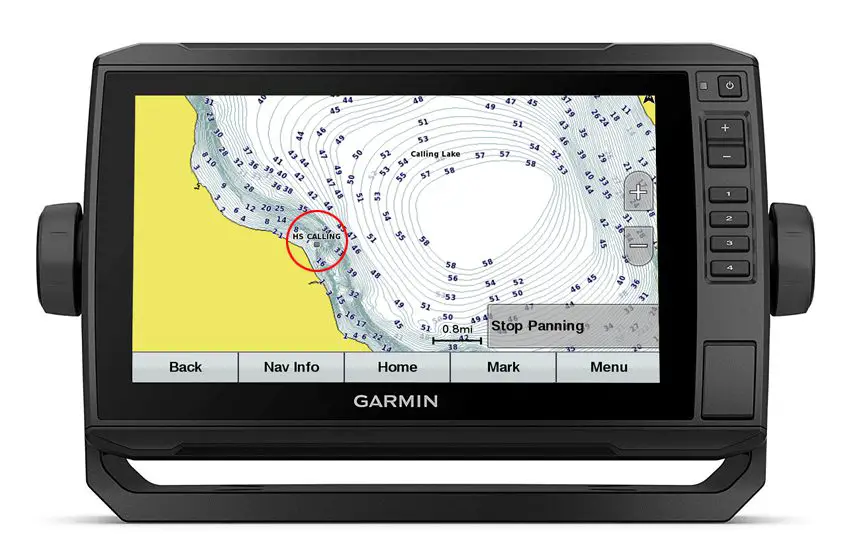
MAXHAMISH LAKE, BRITISH COLUMBIA
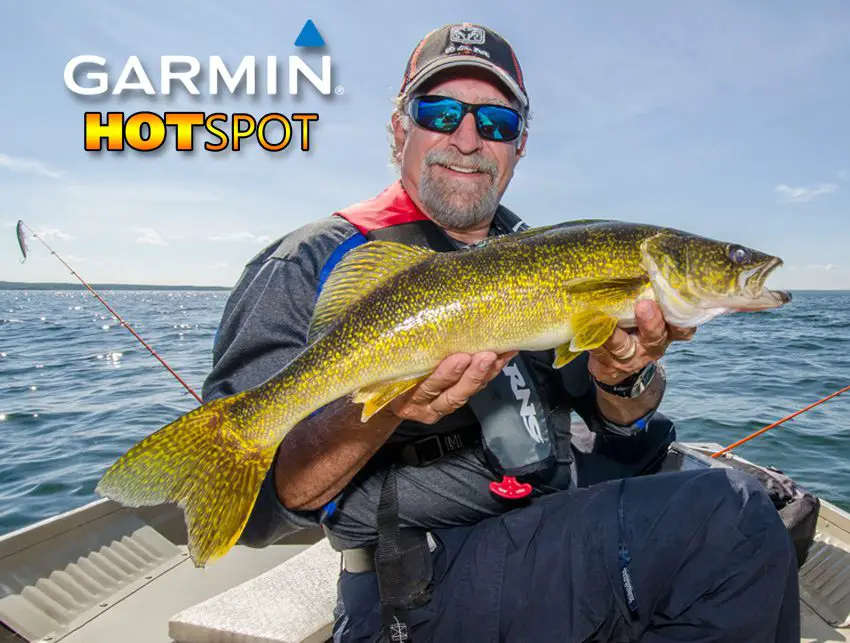
| Location: | Maxhamish Lake, British Columbia |
| GPS: | N 59° 52.732’ W 123° 14.829’ |
| Species: | Walleye |
This Hotspot is a long skinny weed-bed on Maxhamish Lake in British Columbia.
Urs from Northern Rockies Lodge had told us about this weed-bed in the past but we never needed it. On this trip though, we needed it. In a nutshell, there were more Pike and Walleye here than probably any other part of the lake. For every biting fish we encountered, our Panoptix LiveScope showed us anywhere from 3 to 5 times that many fish in the area! It was alive and active with Walleye and Pike. This is truly a fishing hotspot!
For more Hotspots like this one, check out our Hotspots section.
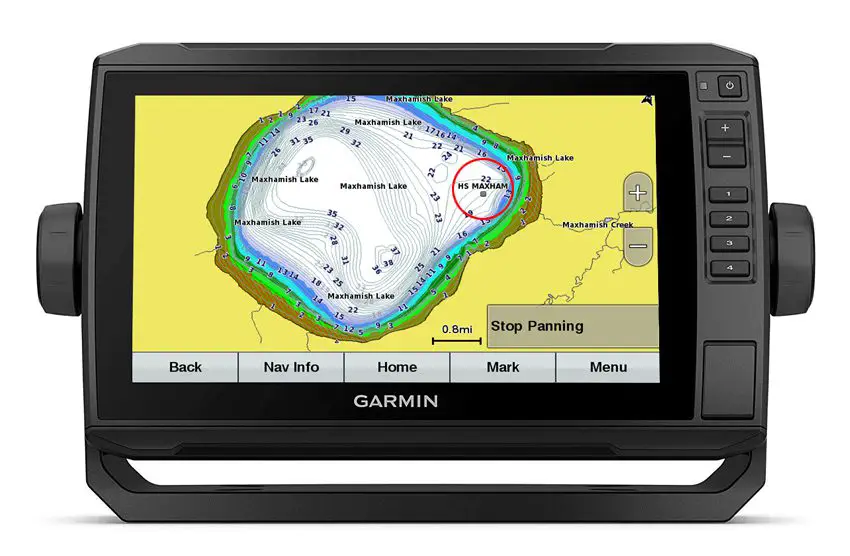
CONCLUSION
Of course there are SO many Walleye hotspots across this country that we could not include all of them in a single “10” article. These ones are specific waypoints on individual bodies of water ranging in sizes from smallish to medium/large. Rivers and huge waters will be in future articles.

Electronics are so important these days. Not just for finding fish, but for locating bait fish, structure, “way points” on unfamiliar lakes, GPS co-ordinates, and much more. I’m keeping my fingers crossed on winning the Garmin. I fish the Wahnapitae River here in Sudbury, Ontario. The river is a flooded forest that was used to float logs to where they would be loaded for transport to the lumber mills. The river is a nightmare of logs and sunken trees and would be nice to see the bottom so I could stop loosing anchors that are getting hung up.